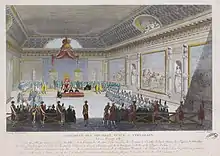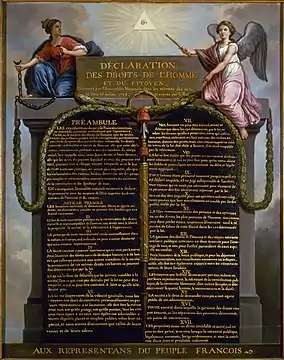Assembly of Notables
An Assembly of Notables (French: Assemblée des notables) was a group of high-ranking nobles, ecclesiastics, and state functionaries convened by the King of France on extraordinary occasions to consult on matters of state. Assemblymen were prominent men, usually of the aristocracy, and included royal princes, peers, archbishops, high-ranking judges, and, in some cases, major town officials. The king would issue one or more reforming edicts after hearing their advice.[1]
.jpg.webp)

This group met in 1583, 1596–97, 1617, 1626, 1787, and 1788. Like the Estates-General, they served a consultative purpose only. But unlike the Estates-General, whose members were elected by the subjects of the realm, the assemblymen were selected by the king for their "zeal", "devotion", and their "trustworthiness" toward the sovereign.[2]
In addition, assembly of notables can refer to an expanded version of the King's Council (Curia regis). Several times a year, whenever the king needed to cast a wider net to gather information for making important decisions or preparing edicts and ordinances, he would enlarge his Council with prominent men chosen for their social and professional standing or their skills to give counsel on the matters at hand. The role of the assembly was to advise the king on how to remedy governance issues brought up by the Estates-General.
1583 assembly
In November 1583, Henry III convened an assembly of notables at Saint Germain-en-Laye to address religious demonstrations that threatened the collapse of the State. In the assembly, Charles, Cardinal de Bourbon called for a religious monopoly in France; he said that if this was offered, the clergy would sell their shirts to support the king.[3] Henry, however, angrily interrupted him, knowing the origin of that hostile demand; any attempt to impose one religion was unthinkable while Anjou remained attached to the Netherlands. Henry replied that he had already risked his life and estate to establish a single religion, but since he had been forced to sue for peace, he would not breach it.[3]
1596 assembly
Following the regicide of Henry III, his successor was Henry IV who learned from the experience of Henry III. He himself had called on the assembly's assistance in 1596–97 at Rouen. The assemblymen were summoned to assist in developing and authorizing new taxation plans for the country to tackle the debt. There were 95 notables present, and they recommended that the king levy a special sales tax of 5% on all sales—with the exception of wheat, to avoid bread riots. It was estimated that this pancarte would raise 5 million French pounds (livres), but in its best year it raised only 1.56 million pounds. Although the tax raised less than predicted, it did restore the royal budget to solvency. King Henry and the Duke of Sully had come up with many other possible ways to raise money, but the key to rescuing the monarchy from bankruptcy was simply to ensure that the system of taxation worked efficiently.[4]
1626 assembly
In 1626 Louis XIII called together an assembly consisting of the government's ruling elite—13 grandees, 13 bishops, and 29 judges. Many historians have regarded this assembly, and its predecessors, as unsuccessful because they failed to enact specific reforms, but this view fails to consider the assemblies' role. The assemblies had no legislative or administrative powers; instead, they served to provide considered advice on government reform proposals and to make appropriate counter-proposals. In the case of every successful assembly, the king himself would issue a major ordinance or enact significant reforms, most notably the Edict of Blois 1579, in response to the Estates-General of 1576, and the great Code Michau 1629, in response to the Assembly of Notables of 1626–27.[5]
The king and the notables agreed on four basic changes in French government. First, they agreed that Protestant power had to be broken. There was no specific discussion of a march on La Rochelle, but the notables firmly supported the king's desire to destroy the network of independent Huguenot fortresses. Second, the notables, like those of 1596 and 1617, strongly criticized the grandees, particularly provincial governors. In 1626–27, the notables insisted in particular that the king should regain full control of the military. Third, everyone agreed that the basic administration of the kingdom lay in disarray, so that a strong statement from the central government was needed to reestablish order. In most cases, this reaffirmation of government control required only the restatement of pre-existing ordinances. Fourth, everyone agreed that the fiscal situation was catastrophic. The overwhelming majority of the assembly's deliberations focused on this last issue.[6]
1787 assembly
The final appearance of the Assembly of Notables began in February 1787 during Louis XVI's reign, during which France’s finances were in a desperate situation and the finance ministers of the day (Turgot, Necker, Calonne) all believed that tax reform was necessary if France was going to pay off its debt and bring government expenditure back into line with government income. However, before any new tax laws could be passed, they first had to be registered with the French parlements (which were high courts, not legislatures, but that possessed a limited veto power on new laws).
Repeated attempts to implement tax reform failed due to lack of parlement support, as parlement judges felt that any increase in tax would have a direct negative effect on their own income. In response to this opposition, the finance minister at the time, Calonne, suggested that Louis XVI call an Assembly of Notables. While the Assembly of Notables had no legislative power in its own right, Calonne hoped that if the Assembly of Notables could be made to support the proposed reforms then this would apply pressure on parlement to register them.
Calonne proposed four major reforms:[7]
- a single land-value tax
- the conversion of the corvée into a money tax
- the abolition of internal tariffs
- the creation of elected provincial assemblies
In the traditional view, the plan failed because the 144 assemblymen, who included princes of the blood, archbishops, noblemen and other people from the traditional elite, did not wish to bear the burden of increased taxation.
However, Simon Schama has argued that the notables in fact were quite open to radical political changes; for example, some proposed the elimination of all the tax exemptions conferred by noble status; others proposed lowering the income qualifications for voting for members of the proposed provincial assemblies.[7] Schama wrote:
Yet what was truly astonishing about the debates of the Assembly is that they were marked by a conspicuous acceptance of principles like fiscal equality that even a few years before would have been unthinkable....Where disagreement occurred, it was not because Calonne had shocked the Notables with his announcement of a new fiscal and political world; it was either because he had not gone far enough or because they disliked the operational methods built into the program.[7]
In addition, the Assembly insisted that the proposed reforms should actually be presented to a representative body such as the Estates-General.
Opposition in the Assembly combined with intrigues from rival ministers led to Calonne's disgrace and he was subsequently dismissed by Louis XVI on 8 April 1787. In addition to tax reform, the Assembly also discussed other issues. The result was that the Assembly assisted the Parliament in creating provincial assemblies, reestablished free trade in grain, converted the corvée (a feudal duty in the form of forced labour) into a cash payment, and generated short-term loans.[8]
Calonne's successor, Loménie de Brienne, dissolved the body on 25 May.[7]
See also
- Grand Sanhedrin, which sanctioned the decision of an Assembly of Jewish Notables in 1806
Notes
- Collins, p. xix
- Mousnier, p. 229
- Sutherland, p. 54
- Baumgartner, p. 233
- Collins, p. 47
- Collins, pp. 47–48
- Schama, Simon (1989). Citizens: A Chronicle of the French Revolution. Random House. pp. 287–92, 310.
- Collins, p. 258
References
- John Hardman, Overture to Revolution: The 1787 Assembly of Notables and the Crisis of France's Old Regime. Oxford University Press, 2010
- Vivian R. Gruder, The Notables and the Nation: The Political Schooling of the French, 1787–1788. Harvard University Press, 2008.
- Collins, James; The State in Early Modern France. New York: Cambridge University Press 1995.
- Mousnier, Roland; The Institutions of France under the Absolute Monarchy 1598–1789, Volume II: The Organs of State & Society. Chicago: University of Chicago Press 1979.
- Sutherland, N.M.; Henry IV of France and The Politics of Religion. London: Intellect Books 2004.
- Baumgartner, Frederic; France in the Sixteenth Century. New York: St. Martin's Press 1995.
- Lefebvre, Georges; The French Revolution, Volume I: From its Origins to 1793. New York: Columbia University Press 1962.
- This article incorporates text from a publication now in the public domain: Wood, James, ed. (1907). The Nuttall Encyclopædia. London and New York: Frederick Warne. Missing or empty
|title=(help)
External links
 Media related to Assembly of Notables at Wikimedia Commons
Media related to Assembly of Notables at Wikimedia Commons
